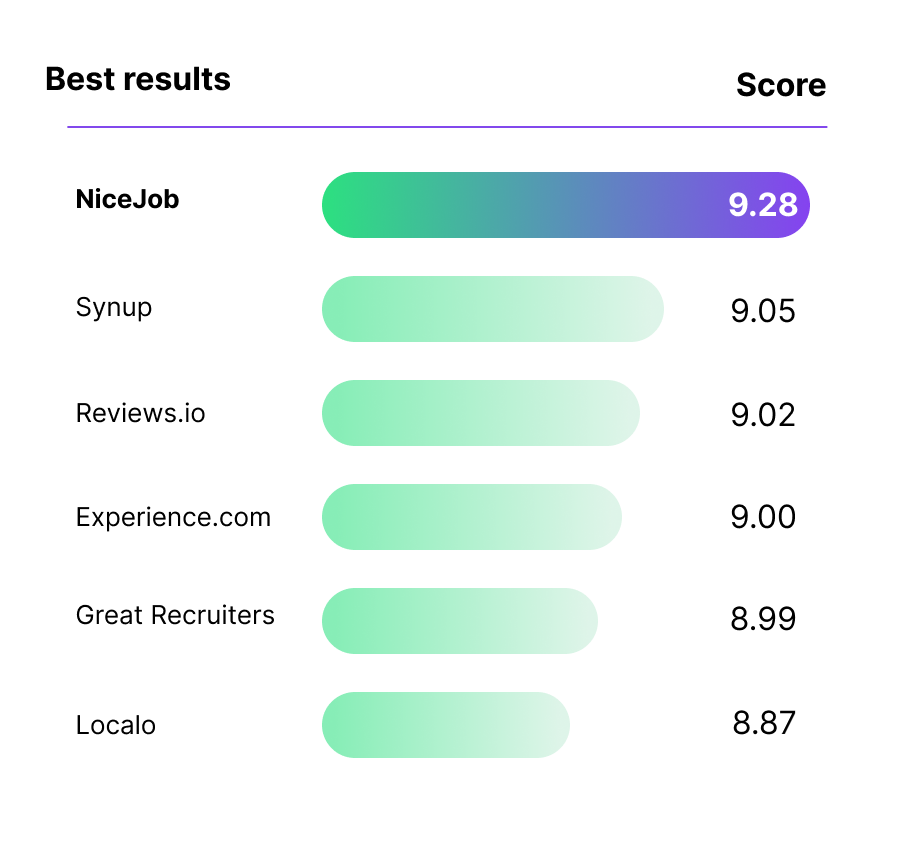How to Check Your Company’s Reputation (and Use It to Your Advantage)
Learn How to Identify and Manage Your Reputation in Three Simple Steps
What do your business reputation and Peter Pan have in common?
There’s a scene in the movie Peter Pan where Peter loses his shadow and chases it around Wendy’s bedroom in an attempt to get it back. I picture a business reputation much like Peter Pan’s shadow. It’s there but it’s hard to tack down.
Even though you can’t physically hold your reputation in your hand or sew it on like Peter does with his shadow, you are able to identify, understand and shape it.
Here we explore how to identify and understand your reputation, based on how I went about understanding the reputation of NiceJob.
And with just a few clicks, customers can research your business, read reviews, and form opinions that can make or break your success.
So, how can you ensure that your reputation is strong, positive, and compelling? It all starts with understanding the importance of reputation management.
In this article, we'll explore why monitoring and improving your reputation is crucial for local businesses.
We’ll also explore how to identify and understand your reputation based on how I understood the reputation of NiceJob.
3 Reasons why it’s important to understand your reputation
You probably have a sense of whether your business reputation is good or poor, solid or questionable. But until you can pinpoint the attributes of your reputation you won’t be able to know what truly matters to your customers, where your business can improve or how to use your reputation to market your business. Let’s unpack this:
- Your reputation impacts customer perception. As a consumer you will appreciate this, since you probably only spend your money with reputable businesses. Your customers do the exact same thing. The perception your customers have about your business and what it stands for will impact whether they decide to spend their money with you or the next business.
- Understanding your reputation helps pinpoint where your business can improve. You know what they say, “pobody’s nerfect!” — and understanding your reputation clarifies where your business can make improvements. For example, if you discover that a large majority of your customers cite “timeliness” as a top quality of your business, you better make sure to prioritize being on time and emphasize it in your marketing.
- Once you understand your reputation you can leverage it to market your business. Reputation marketing is at the heart of what we do at NiceJob. Reputation marketing is the practice of using brand collateral like customer reviews, testimonials, online ratings, community awards and social media mentions in your marketing materials. So reputation marketing increases sales from leveraging your reputation to market your business.
How Can Reputation Marketing Transform Your Business?
Find out how easy it can be to get more reviews, referrals, and sales—without spending a dime on ads!
Watch the Demo
How to identify and understand your business reputation
There are 3 avenues you can use to help gain a better understanding of your business reputation. We’ll go over them here:
- Using customer reviews: Customer reviews are a fantastic way to understand what matters to your customers, what your business does well and what areas exist for improvement. By studying your reviews, you can pick up on repeated patterns. Look for attributes of your service that get mentioned time and time again by your customers. These characteristics are a solid indication of what your reputation stands on.
There are two ways to analyze customer reviews (if you don’t have access to a data scientist, which, let’s face it, not many of us do).
- Randomly select x number of reviews from a given time period and manually go through them looking for commonalities.
- Or, with the Stories widget from NiceJob’s reputation marketing software on your website, you can load your reviews page, select all the text with CTRL-A and then use CTRL-F to look for certain attributes. For example, things that may get mentioned include “professional,” “clean,” “fast,” etc. Anything that gets mentioned a lot is probably a building block of your reputation.
- Engage in social listening: This is when you actively clue in to what’s being said about your business on social media. This can happen on any and all platforms. For instance, perhaps a customer tagged you in a post or story, or maybe your business was mentioned in a community group, or chat. Any mention of your company on social media is an excellent way to tune in to how your community and customers perceive your business. This will give you some understanding of what makes up your reputation.
- Seek direct feedback: Don’t be shy to ask your customers for feedback. Yes, you will be asking them for a favor; however, most people don’t mind giving feedback when the goal is to help a small business learn and grow. Some ways to seek direct feedback include:
- Distributing a short survey.
- Creating a focus group. This can be conducted in-person or online (for example, in a closed Facebook group). Make sure that you aren’t only including customers that are your #1 fans, but rather a diverse group.
It’s worth noting that if you seek direct feedback from people face-to-face they may not be as forthcoming as you’d like. As you can imagine, it can be awkward to give feedback to a business owner about their own company if you have anything less than positive to say. It may be helpful to ask for anonymous feedback.
What is NiceJob’s reputation?
As a reputation marketing company, it’s important to understand our own reputation. I’ll walk you through our internal process of measuring NiceJob’s reputation as an example.
What I know is that overall NiceJob has a good reputation. I had an idea that people hold a positive perception of our tech company. That, however, was the extent of it.
What I wanted to know was, what makes up our reputation and what is our reputation based on? What do other people really think about us and what are they mentioning most often so we can determine what matters to our customers?
I set out to find the answers following the steps outlined above.
1. What are our customers saying about us in our reviews?
The first thing I did was look at our customer reviews. We were able to pull the data and see what people were mentioning most often in our best reviews and what was being said in our worst reviews.
When it comes to the 5-star ratings, we’re able to see that the top five attributes mentioned are:
- Professionalism
- Get great results
- Would recommend this company
- People are communicative
- Company is highly experienced

“Our hypothesis, our gut feeling of why people choose NiceJob was that the number one reason was results and the number two reason was service. We now have fairly strong validation for that. Reversed in order, but great to see validation.”
~ Lars Kristensen, Founder & CEO of NiceJob
Equally important, I wanted to know what people are saying about NiceJob should they not have a positive experience with the company. These results were pulled from the reviews rated as 1 or 2 stars. Keep in mind, NiceJob only has 5 total reviews out of 598 that are rated this low (so the data is not substantial).
We can see that the top attributes mentioned in poor ratings are:
- Poor results
- People not professional
- Service not professional
- Service not reliable
- People uncommunicative

2. Actively engage in social listening
This is something our team does regularly. We have more than one person on our team monitoring for mentions of our company on social media and engaging with what our community has to say.
Here are a couple of examples that we’ve pulled from social media; we can see that similar themes we found mentioned in our reviews are echoed on social media by our customers.
In these examples we can infer that people are happy with their results from using NiceJob and would recommend us to their peers. These examples have been grabbed from Facebook and Instagram.


3. Seek direct feedback from customers
At NiceJob we receive direct feedback from our customers in a couple of ways:
- We use Intercom as a messaging platform. This is where we receive the bulk of our messages from customers. Sometimes we seek feedback directly from the customer and other times they are forthcoming and provide it on their own terms.
- We also receive direct feedback via email and social media.
Much like our reviews, most of the direct feedback we receive is positive in nature and echoes what we see in our reviews. Like all companies, we get critical and negative feedback from time to time and if it’s going to show up anywhere, it will be in the form of direct feedback.
We use this type of feedback to improve our service and app.
Fortunately, this does not make up the bulk of what we hear from customers. It’s more reliable for us to understand our reputation from the resounding positive majority and learn from the critical minority. This is how we get better.
Below are a couple of examples to illustrate what our customers have to say about NiceJob by way of direct, private communication we’ve had with them.
Here is a positive piece of direct feedback we received in a personal Facebook message. This specifically talks to the results of the service and gives praise to the NiceJob team.

On the other hand, this is a piece of critical feedback we received after making updates to our app. This arrived via Intercom, and addresses one customer’s concern around a lack of communication.

Although this is not how the majority of our customers feel, it is certainly not something we want to contribute to our reputation. This falls into the category of “areas to improve.”
All in all, this exercise in uncovering the building blocks of NiceJob’s reputation has helped me understand what matters to our customers. They are vocal and it’s our job to listen and improve.
This analysis will also help our marketing team know which benefits to highlight in our advertising. For instance, we will run tests to see if “getting results” is something that attracts new leads, considering how important it is to current customers.
NiceJob is #1 For Reputation Marketing
Our customers have rated us the top software for small businesses in the following categories:
-Best results
-Easiest to implement
-Easiest to use
-Best customer service

Bonus: 3 additional ways to look up a business's reputation
In addition to the steps I previously mentioned, let me share with you two more reliable ways to uncover a business's reputation.
By utilizing these methods, you'll be equipped with the tools to navigate the sea of information and make confident decisions about your company and those you choose to work with.
Google and other search engines
Most businesses, local ones in particular, will have a Google Business Profile. As a business owner or team member, you'll have to claim and optimize that profile with up-to-date company information.
And when it comes to reputation, your Google Business Profile will also house all of your Google reviews and display the average star rating. Here's an example of an unoptimized versus optimized profile:

After a quick search of your business or related business, people will either dig deeper if you have at least a 4+ star rating and a lot of reviews, or... they'll pay you no mind because it appears your reputation isn't good let alone great.
With Google's Generative Search Experience (SGE) now rolled out in many countries, there are even more way to check a company's reputation. Take a look at this example:
 In the bottom half, the "People talk about" section, you can see both prominent topics or aspects of each restaurant as well as related reviews. And let's face it, that's all some people will have to see before they say "yes" or "no" to your business regardless of the industry.
In the bottom half, the "People talk about" section, you can see both prominent topics or aspects of each restaurant as well as related reviews. And let's face it, that's all some people will have to see before they say "yes" or "no" to your business regardless of the industry.
Business Ratings and Accreditation
Check business ratings and accreditations from reputable sources. Organizations such as the Better Business Bureau (BBB) or Chamber of Commerce may provide ratings or accreditations for companies. These ratings can give you an idea of the company's standing and commitment to ethical business practices.
Media coverage
Look for any media coverage related to the particular company. Positive coverage in reputable local news outlets can indicate a good reputation, while negative press or scandals may raise concerns. Consider the credibility and reliability of the sources reporting on the company.
Understanding your reputation to help your business grow
Now that we have a concrete understanding of what makes up our reputation, we can use this to improve our service and app and know which benefits to highlight in our marketing efforts moving forward.
Now it’s your turn.
Find out what makes up your business reputation. This way you too can understand what matters most to your customers, find ways to provide even better service and use attributes of your reputation to market to new leads.
Turn Your Reputation into Your Ultimate Sales Tool
Learn how to build trust and attract more customers with our complete guide to reputation marketing.
Read the Guide%20(1)%20(1).png)



.jpg)

